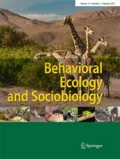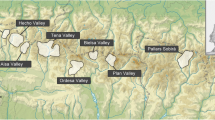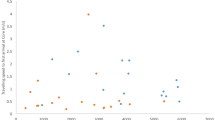Abstract.
To explain coloniality in birds and bats, communal roosts have been hypothesized to serve as information centers where colony members transfer knowledge about their habitat. If information is exchanged about food, individuals with low hunting success benefit by following successful foragers to their profitable feeding sites. Colony members should therefore forage together regularly and move in pairs or groups among different feeding places. In 1996 and 1997, we used radio-telemetry to study the nightly habitat use of ten adult female Bechstein's bats (Myotis bechsteinii) living in one maternity colony. Over several nights, each bat revisited its own foraging area, although females regularly switched day-roosts at the same time. Most individual foraging areas showed no, or only little, overlap with each other. Distances between individual activity centers were negatively and significantly correlated with the degree of individual day-roost association. Genetic similarity among colony members, determined using seven nuclear microsatellites, was significantly positively correlated with the degree of overlap among individual areas. Five females were repeatedly radio-tracked at different seasons, months apart. Even between years, all bats maintained their individual hunting areas. Because females are very loyal to their individual foraging areas and these areas are typically substantial distances from each other, information transfer about feeding sites is unlikely to be the crucial factor promoting coloniality. Therefore, other benefits of sociality like cooperative breeding may cause communal roosting. Strong fidelity to individual foraging areas suggests the importance of familiarity with the local habitat, and profound site knowledge could be a crucial "resource", promoting female philopatry in Bechstein's bats.
Similar content being viewed by others
Author information
Authors and Affiliations
Additional information
Electronic Publication
Rights and permissions
About this article
Cite this article
Kerth, G., Wagner, M. & König, B. Roosting together, foraging apart: information transfer about food is unlikely to explain sociality in female Bechstein's bats (Myotis bechsteinii). Behav Ecol Sociobiol 50, 283–291 (2001). https://doi.org/10.1007/s002650100352
Received:
Revised:
Accepted:
Issue Date:
DOI: https://doi.org/10.1007/s002650100352




